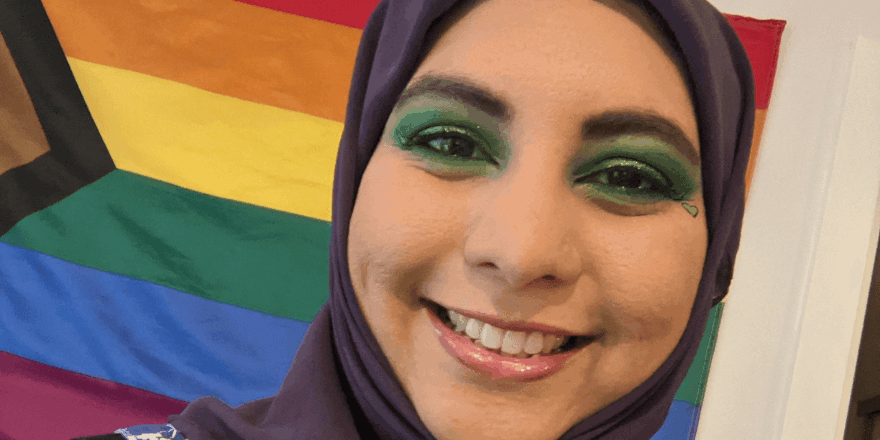Who I am is unacceptable to some people in the healthcare system

This Bi Health Month we spoke with Hafsa (she/her) about her experiences in healthcare and heard about why bi inclusion is crucial for bi people’s wellbeing.
This article talks about biphobia, and mentions mental illness, suicide, domestic violence and sexual abuse.
My name’s Hafsa, I’m a bi Muslim woman and I work as a Client Account Manager at Stonewall. I’m also disabled and a person of colour. All of these adjectives together have affected the type of healthcare I have received. From being told I was a ‘bad Muslim’ for trying to end my life, that I’m going to hell for loving another woman, and many, many speculations about my perceived sexual activity. All by medical professionals.
When I was younger, I had more belief in the authority of medical professionals. I trusted their words, without question. As I have gotten older and been more open about my identity as a bi Muslim, that perception has changed. I can no longer deny that who I am is unacceptable to some in the care of the health and wellbeing of others. I can no longer deny that to many, I am a curio. An oddity. An exotic bit of gossip over lunch. I am often stripped of my personhood, for existing as the person I’ve always been.
I can no longer deny that to many, I am a curio. An oddity. An exotic bit of gossip over lunch. I am often stripped of my personhood, for existing as the person I've always been.
The LGBT in Britain – Bi Report found that over 20% of bi people in Britain have experienced inappropriate curiosity from healthcare professionals when trying to access care. And that’s us bis that got as far as trying. Some of us have had such bad experiences that our faith in medical professionals has all but diminished. Trans and non-binary people report having the onus put on them to educate their GPs, with one activist and community expert stating, ‘at best you’re being misgendered, but at worst people don’t know how to engage with your body.’ (TRANSforming Futures, Trans Healthcare Report.)
I have been treated as ‘crazy’ for struggling with depression and suicidal ideation. Because that’s not what good Muslim women do. I have been told to pray more and drink water by the same Doctors that denied me anti-depressants as a teenager. And unfortunately, I am not alone in that experience. Bi people are more likely to report mental health problems than gay and lesbian people (LGBT in Britain – Bi Report). And most damning of all, 50% of bi people reported that life wasn’t worth living. That’s half of us. Half of us are in crisis, and we’re not talking about it enough.
And most damning of all, 50% of bi people reported that life wasn't worth living. That's half of us. Half of us are in crisis, and we're not talking about it enough.
I am not some niche case. When people hear ‘bi Muslim’ they assume there’s about 3 of us in the UK, so what’s the big deal? The Bi Report found that 30% of our bi respondents identified as people of faith. You don’t often hear about people like me, because we are forced to stay or go back in the closet from the biphobia around us. And when it permeates our healthcare, that effect is tenfold. Biphobia is not ‘homophobia-lite’. It is omnipresent and actively harmful, especially when it prevents us from accessing the healthcare we need. For example, in a focus group about PrEP (pre-exposure prophylaxis) with gay and bisexual men, some participants held the attitude that PrEP users are ‘promiscuous, irresponsible, immoral and naïve’. These words are often used to stigmatise bi people.
The Bi Report found that 30% of our bi respondents identified as people of faith. You don't hear about people like me, because we are forced to stay or go back into the closet from the biphobia around us. And when it permeates our healthcare, that effect is tenfold.
Promiscuity has been part of the ‘bi discourse’ for a long time. Some people say bi people are greedy, overtly sexual, and indiscriminate about who we sleep with. But even if those things were true, why is that a bad thing? Surely those of us with multiple sexual partners should be encouraged to seek better sexual healthcare, not shamed for needing such care in the first place. And these stereotypes erase bi ace people completely. Even raising these issues with a healthcare professional can prompt unhelpful discussions about what is or isn’t an ‘appropriate’ level of sexual activity.
Some people say bi people are greedy, overtly sexual, and indiscriminate about who we sleep with. But even is those things were true, why is that a bad thing?
As bi people, we are at a higher risk of domestic violence and sexual abuse than LG people, with 13% of us having experienced unwanted sexual contact (LGBT in Britain – Bi Report). Biphobia makes it that much harder for us to seek vital support. It is more difficult for us to be taken seriously when the very existence of bi identities are still being called into question.
If you’re reading this and want to help bi people, here are ways you can be an active ally for us.
If you’re bi and you’re reading this, know that you’re not alone. You’re not ‘overreacting’. Your feelings are valid. Switchboard is here to listen, and if you wish to speak to an LGBT+ mental health professional, there are resources available.
Let’s do better for the bi community.

